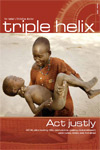In 2007 about a thousand people died in the UK while on the organ transplant list or having recently been removed from it because they were too ill. It is claimed that a system of 'presumed consent' – where unless you have specifically opted out it will be presumed you are thereby opting in – would have made many more organs available and would have saved lives. [1] An anonymous account by an NHS doctor of her husband's untimely death [2] can only add to the pressure to do something about the gap, but is opting out the right way to go?
In a 2007 CMF submission [3] to a House of Lords Select Committee we expressed strong support for the principle of organ transplantation and saw no major ethical problems per se. Regarding opt-out we noted that CMF had not yet been able to hold a full debate, were aware that British Medical Association policy was to support an opting-out principle, and were aware of statistics in several EU countries reporting increased retrieval rates after introducing opt-out policies.
However, we placed much emphasis on the theological basis for our support for donation – namely that of altruistic free gift in a context of fully informed consent. A national opting-out policy would mean that at death the body effectively became the property of the state, and for many Christians this would conflict with the respect owed in biblical and church tradition to the dead body. We had commented extensively on this in a 2002 submission to the Department of Health. [4] Pragmatically, there remains much concern in the UK about the retention of tissue and organs following the Alder Hey scandal, and this may have motivated Parliament when in 2004 it rejected opt-out.
We recognise though the low rates of organ transplantation in the UK. We understand why an opting-out system seems attractive and if the UK is to continue opposing it, we must all do more to increase rates of donation. The Christian church should teach and support the principles of organ donation and transplantation. To the extent that Christian teaching influences public choices we hope this would increase donation rates, though people dislike planning for death because they do not like intimations of mortality. Some celebrities have lent their support to blood donation and bone marrow donation. Prominent Christian figures should join such role models in encouraging organ donation.
































